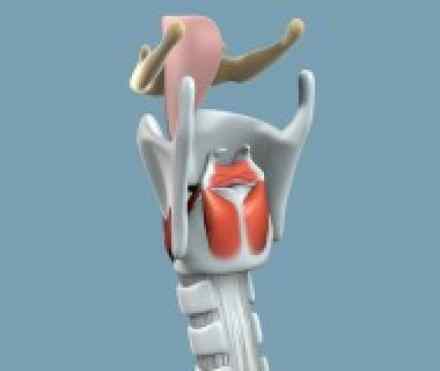
What is it?
Laryngitis is an inflammation of your voice box (larynx) from overuse, irritation or infection.
Inside the larynx are your vocal cords — two folds of mucous membrane covering muscle and cartilage. Normally your vocal cords open and close smoothly, forming sounds through their movement and vibration. But in laryngitis, your vocal cords become inflamed or irritated. This swelling causes distortion of the sounds produced by air passing over them. As a result, your voice sounds hoarse. In some cases of laryngitis, your voice can become almost undetectable.
Laryngitis may be short-lived (acute) or long lasting (chronic). Most cases of laryngitis are triggered by temporary viral infection or vocal strain and are not serious. Persistent hoarseness can sometimes signal a more serious underlying medical condition.
Symptoms
In most cases laryngitis symptoms last less than a couple of weeks and are caused by something minor, such as a cold. Less often, laryngitis symptoms are caused by something more serious or long lasting. Laryngitis signs and symptoms can include:
- Hoarseness
- Weak voice or voice loss
- Tickling sensation and rawness of your throat
- Sore throat
- Dry throat
- Dry cough
Causes
Acute laryngitis
Most cases of laryngitis are temporary and improve after the underlying cause gets better. Causes of acute laryngitis include:
- Viral infections such as those that cause a cold
- Vocal strain, caused by yelling or overusing your voice
- Viruses such as measles or mumps
- Bacterial infections such as diphtheria, although this is rare
Chronic laryngitis
Laryngitis that lasts more than three weeks is known as chronic laryngitis. This type of laryngitis is generally caused by irritants over time. Chronic laryngitis can cause vocal cord strain and injuries or growths on the vocal cord (polyps or nodules). These injuries can be caused by:
- Inhaled irritants, such as chemical fumes, allergens or smoke
- Acid reflux, also called gastro-oesophageal reflux disease (GORD)
- Chronic sinusitis
- Excessive alcohol use
- Habitual overuse of your voice (such as with singers or cheerleaders)
- Smoking
Less common causes of chronic laryngitis include:
- Bacterial or fungal infections
- Infections with certain parasites
Other causes of chronic hoarseness include:
- Cancer
- Vocal cord paralysis, which can result from injury, stroke, a lung tumor or other health conditions
- Bowing of the vocal cords in old age
Risk factors
Risk factors for laryngitis include:
- Having a respiratory infection, such as a cold, bronchitis, or sinusitis
- Exposure to irritating substances, such as cigarette smoke, excessive alcohol, stomach acid, or workplace chemicals
- Overusing your voice, by speaking too much, speaking too loudly, shouting, or singing
Complications
In some cases of laryngitis caused by infection, the infection may spread to other parts of the respiratory tract.
Diagnosis
The most common sign of laryngitis is hoarseness. Changes in your voice can vary with the degree of infection or irritation, ranging from mild hoarseness to almost total loss of your voice. If you have chronic hoarseness, your doctor may want to listen to your voice and examine your vocal cords, and he or she may refer you to an ear, nose and throat specialist.
These techniques are sometimes used to help diagnose laryngitis:
- Laryngoscopy. Your doctor can visually examine your vocal cords in a procedure called laryngoscopy, by using a light and a tiny mirror to look into the back of your throat. Or your doctor may use fiber-optic laryngoscopy. This involves inserting a thin, flexible tube (endoscope) with a tiny camera and light through your nose or mouth and into the back of your throat. Then your doctor can watch the motion of your vocal cords as you speak.
- Biopsy. If your doctor sees a suspicious area, he or she may do a biopsy — taking a sample of tissue for examination under a microscope.
References
http://www.nhs.uk/conditions/laryngitis/Pages/Introduction.aspx
http://www.medicinenet.com/laryngitis/article.htm
http://www.hse.ie/eng/health/az/L/Laryngitis/
http://www.healthline.com/health/laryngitis-2

